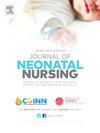Midwives’ attitudes, motivations, and barriers to neonatal resuscitation in a tertiary hospital, Ghana: A qualitative inquiry
Q2 Nursing
引用次数: 0
Abstract
Aim
Neonatal mortality is notably high, especially on the first day, with birth asphyxia demanding urgent resuscitation. In Ghana, midwives play a crucial role in maternal and newborn care, but their experiences with neonatal resuscitation remain largely unexplored. This study, therefore, sought to explore midwives’ experiences in neonatal resuscitation within the immediate postnatal period.
Methods
An exploratory, descriptive research design was used. Twelve (12) midwives were interviewed face-to-face with the aid of a semi-structured interview guide. Each interview lasted between 45 min to 1 h. Data were analysed using inductive content analysis.
Findings
Three (3) major themes and eleven (11) sub-themes emerged, highlighting midwives' attitudes toward neonatal resuscitation, motivations, and challenges, including compassionate care, a drive to save newborns, and issues like delays and inadequate preparation.
Conclusion
Despite challenges, midwives' compassion in neonatal resuscitation was evident. Improved training and resources are recommended to ensure prompt, effective resuscitation and better newborn outcomes.
加纳一家三级医院助产士对新生儿复苏的态度、动机和障碍:定性调查
目的新生儿死亡率特别高,特别是在出生第一天,新生儿窒息需要紧急复苏。在加纳,助产士在孕产妇和新生儿护理中发挥着至关重要的作用,但她们在新生儿复苏方面的经验在很大程度上仍未得到探索。因此,本研究旨在探讨助产士在新生儿产后复苏的经验。方法采用探索性、描述性研究设计。在半结构化访谈指南的帮助下,对12名助产士进行了面对面的访谈。每次访谈持续45分钟至1小时。数据采用归纳内容分析法进行分析。研究结果出现了三(3)个主要主题和十一(11)个次要主题,突出了助产士对新生儿复苏的态度、动机和挑战,包括富有同情心的护理、拯救新生儿的动力,以及延误和准备不足等问题。结论尽管面临挑战,助产士在新生儿复苏中的同情心是显而易见的。建议改进培训和资源,以确保及时有效的复苏和更好的新生儿结局。
本文章由计算机程序翻译,如有差异,请以英文原文为准。
求助全文
约1分钟内获得全文
求助全文
来源期刊

Journal of Neonatal Nursing
Nursing-Pediatrics
CiteScore
2.00
自引率
0.00%
发文量
143
期刊介绍:
Aims & Scope: This is the practical, bimonthly, research-based journal for all professionals concerned with the care of neonates and their families, both in hospital and the community. It aims to support the development of the essential practice, management, education and health promotion skills required by these professionals. The JNN will provide a forum for the exchange of ideas and information between the range of professionals working in this field; promote cooperation between these professionals; facilitate partnership care with families; provide information and informed opinion; promote innovation and change in the care of neonates and their families; and provide an education resource for this important rapidly developing field.
 求助内容:
求助内容: 应助结果提醒方式:
应助结果提醒方式:


